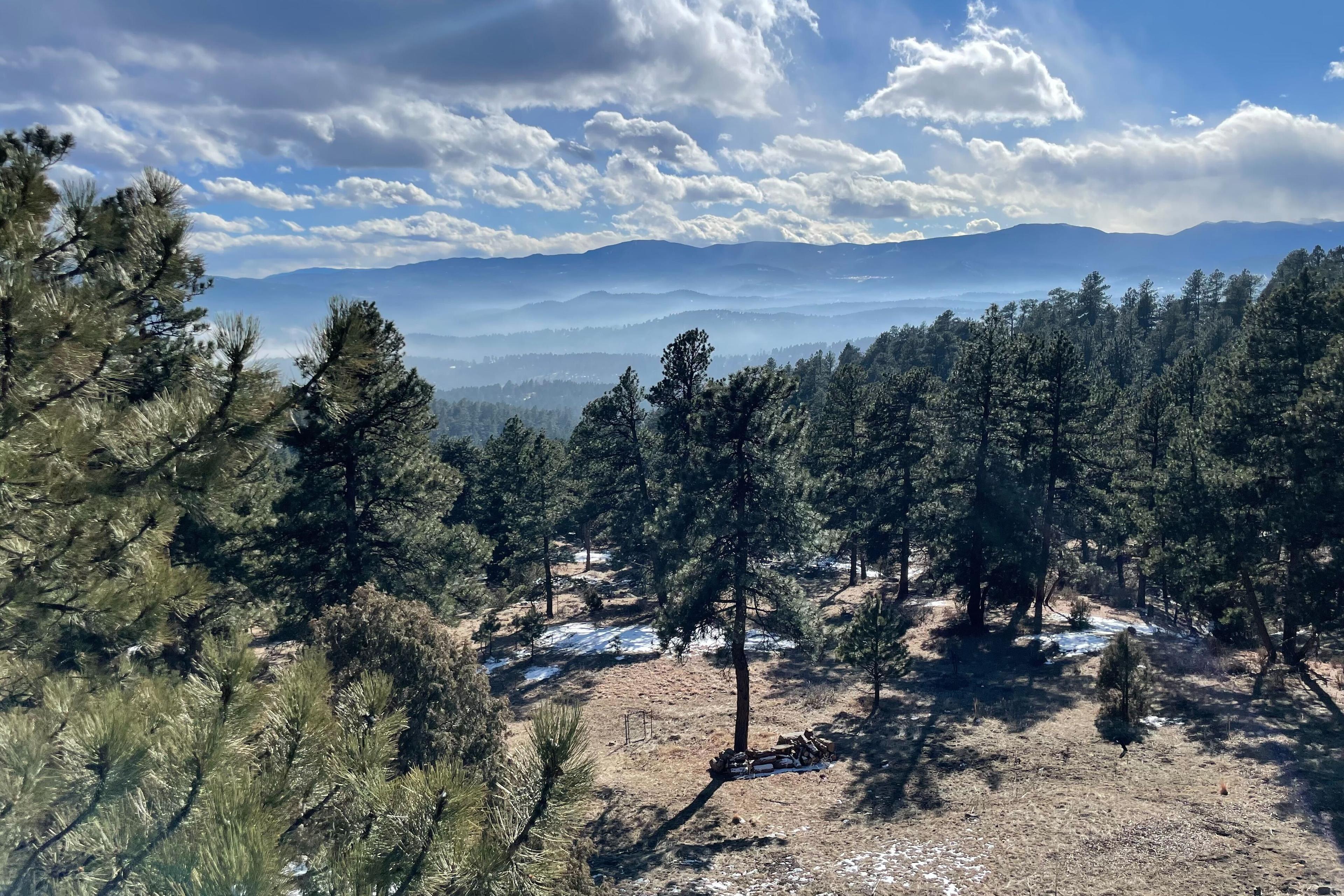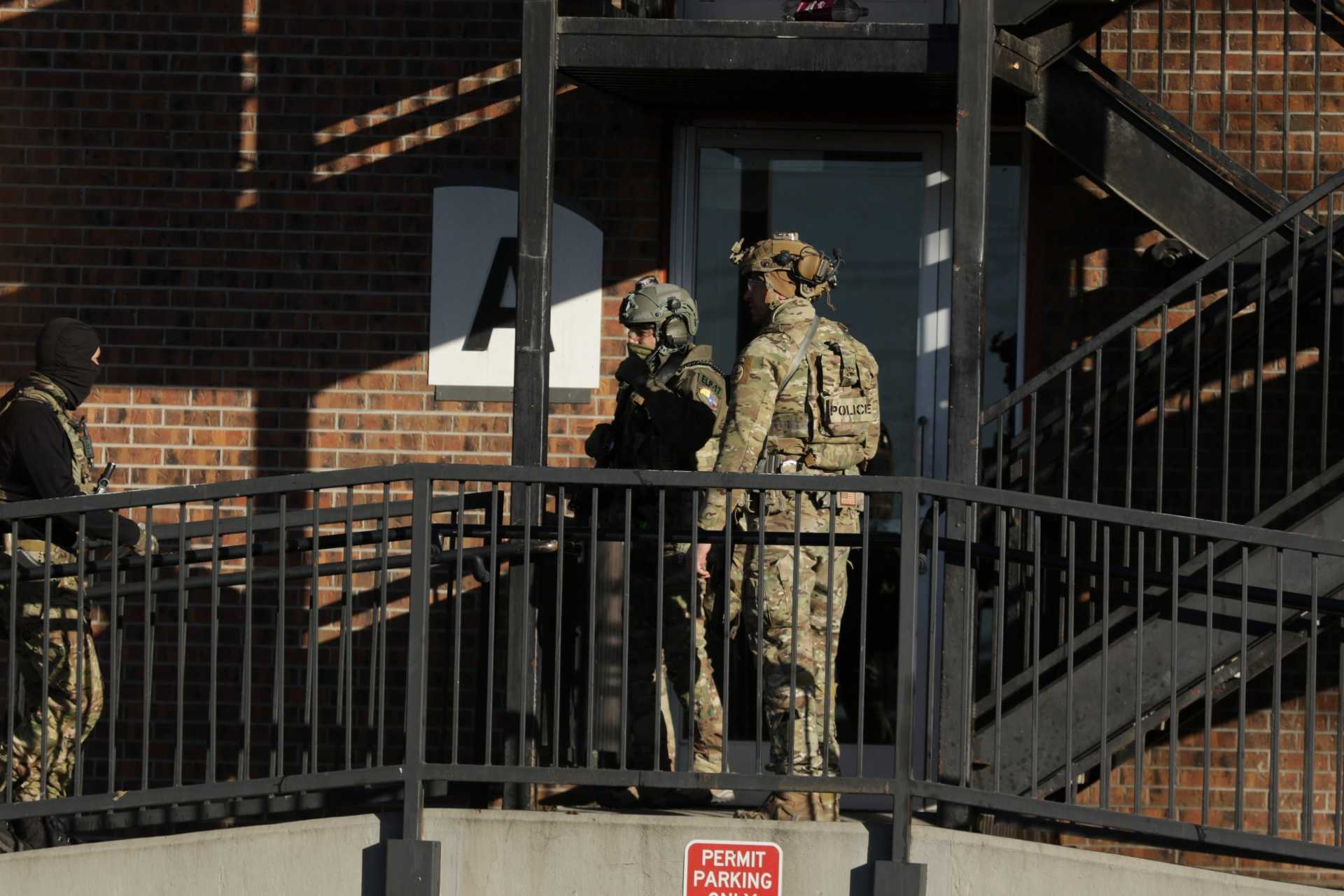
The pre-dawn raids on Aurora and Denver apartment buildings had all the hallmarks of a major law enforcement operation.
Burly men dressed for combat and carrying a battering ram and a federal warrant. Some sort of smoke or flash grenade thrown to distract the alleged bad guys, though no one was really around. A film crew in tow to record it all, along with social media posts likely directed at a national audience.
But as the effort expanded across the metro area throughout the day, it became apparent that while the operation had the veneer of a criminal investigation, it was really an immigration operation designed to let ICE capture and take into custody as many people as possible.
“Of course Homeland Security and ICE have always conducted immigration enforcement operations,” said John Walsh, the Denver District attorney, and the former US Attorney for Colorado under President Barack Obama. “I think we're seeing certainly rhetoric surrounding these operations that is of a different character than anything I've seen before.”
In the end, no official tally of those taken into custody was given. A FOX News report said only 30 people were detained. Though authorities had said they wanted to capture 100 members of a Venezuelan gang in Wednesday’s action, the same report said only one person who was detained had gang ties. No evidence of that tie was offered.
But while the number of people detained was small, the effort nonetheless blurred the lines between civil immigration enforcement and criminal law enforcement in uncomfortable ways for local prosecutors, former prosecutors and immigration attorneys who spoke with CPR News.
Raids could hurt community trust
Using a criminal warrant as a pretext for ICE officers to fan out through apartment buildings knocking on doors in the hope of uncovering immigrants living in the U.S. without authorization could make victims and witnesses wary of cooperating with the FBI, ATF and DEA, all of which had agents present alongside ICE. That wariness could trickle down to local police and prosecutors responsible for investigating everything from petty crimes to domestic violence and murder.
“What about child sexual assault, human trafficking? All of these things this community is at risk for underreporting, for increased safety risks,” said Alexis King, the district attorney for Jefferson and Gilpin counties. “And what does that mean for the individual who is being victimized, if we cannot interrupt, intervene and offer some immediate safety measures as well as long-term accountability.”
The distinction between federal law enforcement and civil immigration enforcement exists partly to bolster public safety, current and former prosecutors said. They were joined in that opinion by immigration lawyers who monitored Wednesday’s actions closely or were on the frontlines helping people as they entered detention.
The community needs to be able to trust law enforcement officers and those officers need to be able to rely on the community — and depending on the crime, sources in the community — to tell them things.
“If they don’t trust law enforcement, they probably won’t go to them and tell them, hey there is a dangerous thing happening in my neighborhood,” said Laura Lunn, an immigration attorney at the Rocky Mountain Immigrant Advocacy Network, who works out of the GEO detention center, which houses immigrants. “When you blur the lines between these different agencies, you are causing distrust within the community of both agencies.”
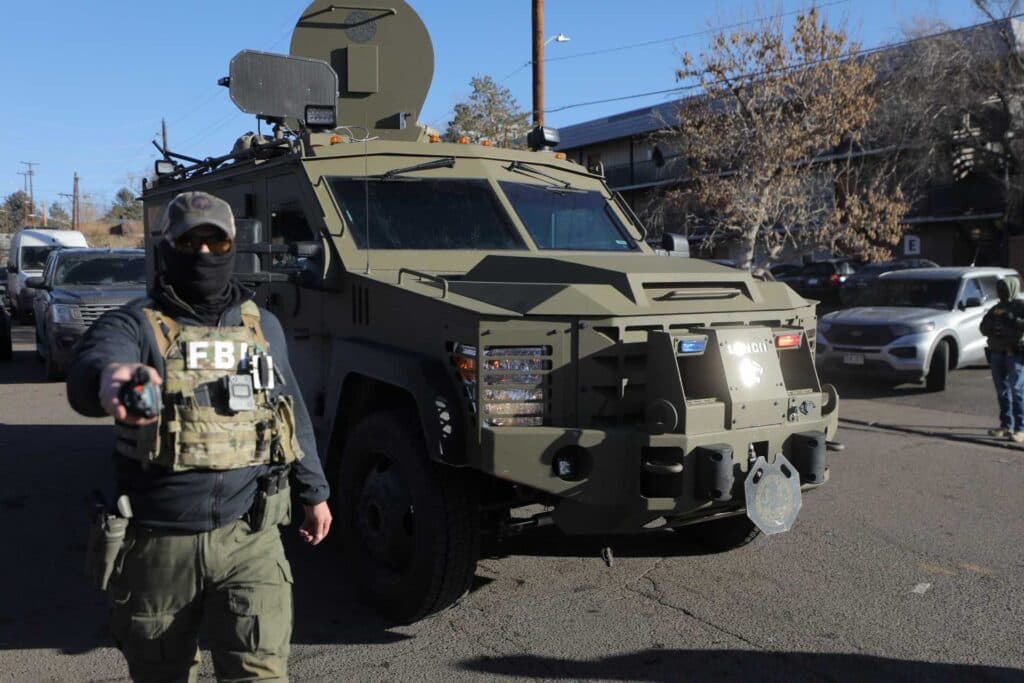
The Denver Police Department said it was too early to know whether there were any public safety ramifications from the immigration enforcement actions, but they continually tell residents that their officers don’t ask about immigration status and don’t enforce any civil immigration laws, as per state law.
“DPD continues to encourage victims and witnesses to report crimes and share information,” a spokesperson said in a statement. “DPD offers interpretation services to help overcome any language barriers to reporting crime.”
Few details, but many social media posts
On Wednesday, the operations were awash in official secrecy — while still relying on social media hype and videos to get a message out.
A local ICE spokesman didn’t comment on the operations on Thursday, but Lunn said the majority of those she had seen who were swept up on Wednesday had existing immigration cases.
“It feels like a reality show to instill fear and make the community feel less safe,” she said. “At the end of the day, people who were in immigration proceedings before are still in immigration proceedings, they may just be in detention as they pursue relief from removal.”
There were federal warrants issued this week — or at least there was one warrant signed by a judge and confirmed by Steffan Tubbs, a DEA spokesman who said in a text message, “we don’t act without a warrant.”
But when asked what the probable cause was for a crime or how many people they took into custody, Tubbs said the agency was “acting in support of ICE” and referred additional questions to them.
Tubbs also said he had no comment on whether he thought working so closely with ICE would jeopardize future law enforcement investigations — or informants — given people may be wary about trusting law enforcement. An FBI Denver spokesperson, whose agency was also on various immigration enforcement scenes all day, referred requests for comment to ICE.
Federal and local cooperation in question
DEA often works closely with local law enforcement and district attorneys offices on big drug trafficking cases that can span the state or the globe.
The Denver district attorney, John Walsh, said that work is vitally important to stemming the flow of dangerous drugs like fentanyl into Denver.
“One of my biggest concerns is that their resources are gonna get diverted to immigration purposes when we have an enormous problem on the drug side and they’re a tremendous partner with us on those matters,” Walsh said.
The U.S. Attorney’s Office had no comment on the actions and wouldn’t answer questions about how many warrants were signed by judges or whether any federal criminal charges might be lodged out of Wednesday’s raids.
It’s not a crime to be in the country without authorization, it’s a civil violation. If an unauthorized immigrant is deported and re-enters, that can be charged as a federal misdemeanor. If an unauthorized immigrant re-enters and then commits another crime, say, a drug crime, then his status and re-entry can be charged as a felony, said Jason Dunn, the Colorado U.S. Attorney during President Trump’s first term.
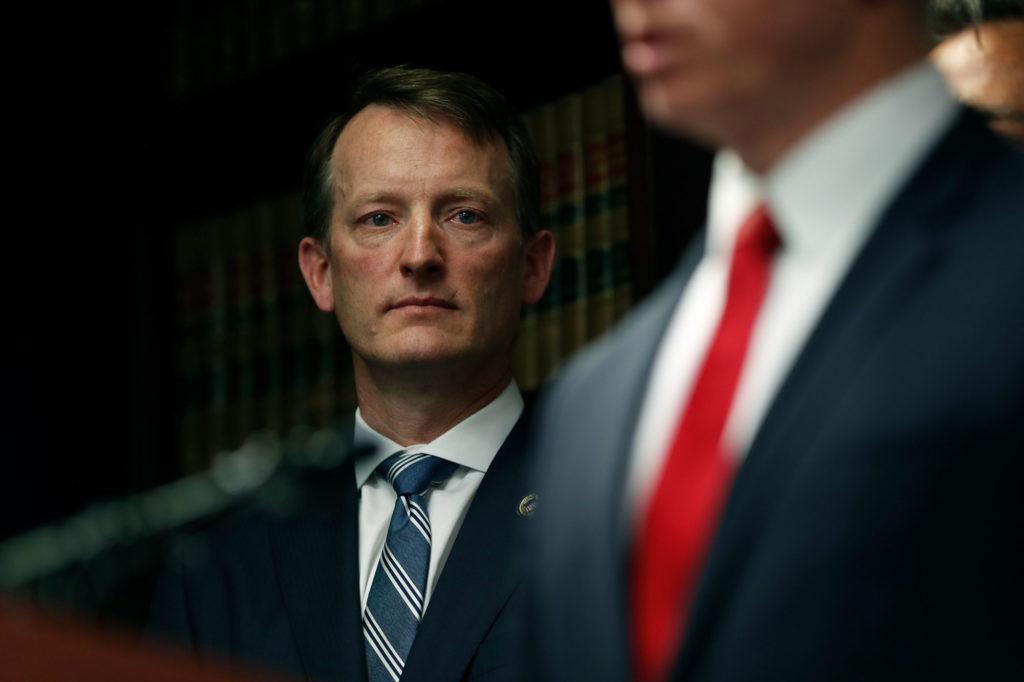
Dunn, on Thursday, said he didn’t remember ever charging people federally simply for being in the country without authorization. But he said sometimes in these immigration roundups, federal officials will hold people to determine whether they’re gang members or have state warrants or other pending matters in the criminal justice system.
People can be technically held in civil immigration detention while their pending immigration case goes through, but that’s both expensive and not always a great use of the resources.
Dunn said during his time as chief federal prosecutor in Colorado, there weren’t mass immigration enforcement actions involving so many federal law enforcement agencies, that this flood-the-zone approach with various law enforcement officers on immigration enforcement scenes appears new.
Every FBI agent or ATF agent or DEA agent standing along the perimeter of a scene while ICE knocks on doors is an agent being taken away from other duties.
“I don’t know if I saw FBI, ATF, DEA being a part of operations that were primarily immigration-oriented,” Dunn said. “It’s a decision the Department of Justice has to make in what it wants to prioritize. It’s a strategic decision and the department has to make it. It’s a matter of where you allocate resources and what you want them to focus on and what that will affect in terms of other efforts.”
High profile raids, little known about results
Late last month, a similar scene unfolded when a warrant signed by a federal judge that was requested by DEA was used to get into a make-shift night club in Adams County.
That morning 49 people were taken into custody and 43, authorities said, were in the country without authorization.
How many of those who remain in federal immigration custody is still unclear, though, as CPR News reported last week, no criminal charges have been filed against anyone -- in state or federal court — as a result of that raid.
The search warrant for the late January nightclub raid, which is believed to have been signed by Magistrate Judge Reid Neureiter based on the case number, has yet to be unsealed.
The immigration enforcement on Wednesday started early and dozens of federal officers roamed apartment hallways yelling “police” in buildings in Aurora and Denver. One apartment resident shared doorbell camera video showing a polite ICE agent asking if he could come into her home to look for guns or drugs. She declined, and the agent and his partner left, but it is hard to imagine a similar fishing expedition taking place in upscale Denver neighborhoods.
The feds parked a large bus, presumably for mass detentions, in an apartment building parking lot. Their vehicles and large presence apparently made it impossible for a school bus to stop and pick up kids to take them to school, prompting the Denver Public Schools Superintendent to drive over there on his own to figure out what was going on.
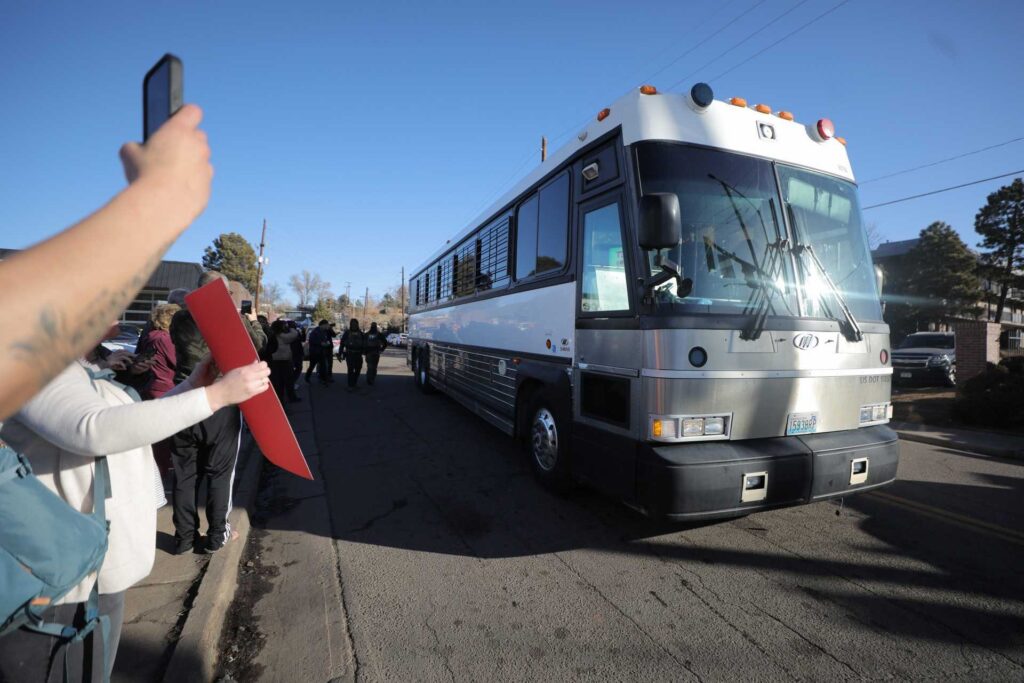
ICE acting director Caleb Vitello released a video on X claiming that Colorado’s laws prohibiting some forms of cooperation between local law enforcement and immigration officials forced them to conduct these efforts at the apartment complexes, rather than just picking people up from county jails.
“Unfortunately we have to come to the communities because we don’t get the cooperation we need from the jails,” Vitello said, standing outside of an apartment building early Wednesday in a ballistic ICE vest. “It would be so much safer for our agents … if we could take those people into custody in a safe environment.”
Nothing prohibits ICE from picking up people outside of a jail, but sheriffs deputies are not allowed to hold people for ICE for longer than their sentences, or after they’ve posted bond.
The Denver Sheriff Department said it won’t hold people for longer than their sentences at ICE’s request, but they will tell ICE when someone of interest is being released from the jail.
“When the DSD receives a request for notification from ICE the individual in custody is advised of their rights upon receipt and prior to release. DSD faxes ICE notification of release when the individual enters into the release process,” a Denver sheriff’s statement said. “It is the responsibility of ICE to arrive at DSD prior to release and take the individual into custody.”
The sheriff’s spokesperson appended a note to the end of the statement: “ICE has requested they be notified via fax.”
Regardless of Colorado’s laws, the immigration enforcement crackdowns - or attempted crackdowns - here recently have been conducted entirely among people not in custody.
Former Denver District Attorney Mitch Morrissey is now a fellow at the Common Sense Institute, which describes itself as a non-partisan think tank but is funded by conservative interests.
He said that for local prosecutors, the raids could affect cases that have nothing to do with immigration, if witnesses who are in the country without proper documentation refuse to cooperate with investigations.
Morrissey noted that in immigrant communities there is already a lower rate of reporting of all types of crimes. And he said that domestic violence crimes are notoriously underreported.
“There are so many issues with failing to report domestic violence,” said Morrissey, who added that the immigration raids would likely provide more incentive not to report. “Sadly, that would be an additional reason.”
CPR’s Arlo Perez Esquivel contributed to this story.





